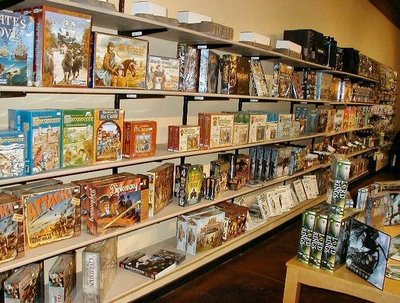Board Games

A board game is a game played with counters or pieces that are placed on, removed from, or moved across a "board" (a premarked surface, usually specific to that game). Simple board games often make ideal "family entertainment" since they are often appropriate for all ages. Some board games, such as chess, go/weiqi, xiangqi, shogi, or oware, have intense strategic value and have been classics for centuries.
There are many different types of board games. Many games simulate aspects of real life. Popular games of this type include:
- Monopoly, which simulates the real estate market
- Cluedo/Clue, which simulates a murder mystery
- Risk, which simulates warfare
Other games only loosely, or do not at all, attempt to imitate reality. These include:
- abstract strategy games like chess, checkers or go
- word games, like Scrabble
- trivia games, like Trivial Pursuit.
A new genre of board games, DVD games, was introduced into the marketplace in 2002 with the launch of the first edition of Scene It (now distributed in the mass market channel by Mattel), and have spawned their own game category.

Backgammon
Backgammon is a board game for two players in which pieces are moved according to the roll of dice and the winner is the first to remove all his pieces from the board. Many variants have developed throughout the world, but most share the same common elements. It is a member of the tables family of games.
The game is essentially a race, and luck plays a measurable role, but backgammon offers a significant scope for strategy. With each roll of the dice, a player must choose between numerous options for moving the checkers, and plan for possible counter-moves by his or her opponent. Opportunities for raising the stakes of the game introduce more strategic intricacies. Players have developed a vocabulary for common tactics and occurrences.
Backgammon is played by two people with 15 checkers each on a board consisting of 24 spaces or points. The checkers are moved according to rolls of the dice. Each player tries to bring his own checkers home and bear them off before his opponent does, hitting and blocking the enemy checkers along the way.
Backgammon has been around a long time, with origins dating back possibly 5000 years. The ancient Greeks played. So did the Romans. The game we know today was refined in England in the seventeenth century, which is also when it acquired the name backgammon. One significant innovation of the twentieth century was the addition of the doubling cube in the 1920s.
Backgammon enjoyed a huge resurgence in the 1970s, then again in the 1990s with the popularity of the Internet. Today, you can play backgammon online any time of the day or night with people from all over the world.







0 Comments:
Post a Comment
<< Home